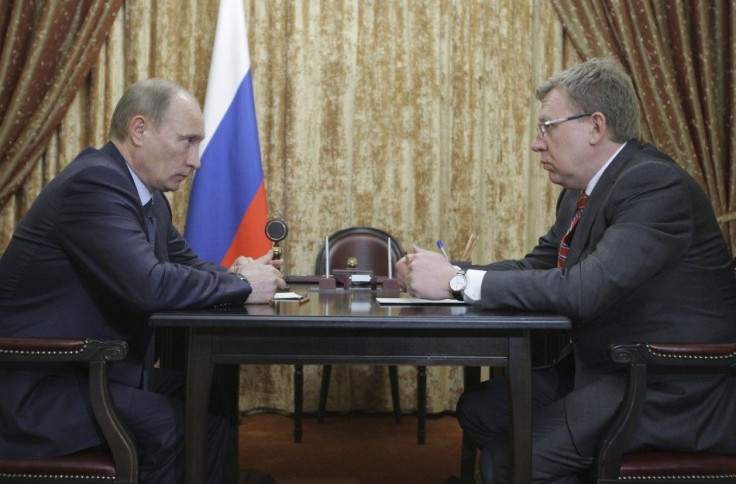Putin's Finance Minister Quits Over Leadership Shake-up

Russian Prime Minister Vladimir Putin's proclamation that he will again run for President has angered his longtime Finance Minister, Alexei Kudrin. On Saturday, Kudrin responded by saying that Putin's decision will not allow me to be a part of the new government.
Kudrin has been Russia's Finance Minister since 2000, serving under President Putin for eight years. He was praised for his financial policies, which helped Russia through the 2008 world economic crisis relatively unscathed.
On Saturday, Putin announced that he would run for his third term as President, while swapping roles with current President Dmitri Medvedev, who would run for Prime Minister. Putin's United Russia Party already has a tight grasp on the Kremlin, and an upset would be very unlikely.
Kudrin claimed his decision stems from a spending disagreement between himself and Medvedev, who wants to increase military expenditures. However, Kudrin's name had previously been mentioned on the short list of people to be Russia's next prime minister, should Putin take the presidency --- however, now it looks like Kudrin would be bumped out by Medvedev.
Russia has a presidential term limit of two consecutive terms -- Putin two straight terms between 2000 and 2008. But he can run again, and in the likely event he wins, he will again be able to serve two terms and could head Russia until 2024 (Russia is raising the term length from four to six years in 2012).
The public nature of Kudrin's decision was a bold move, and criticizing Putin might be political suicide, according to Moskovsky Komsomolets newspaper.
My fate is not known yet, Kudrin said in an interview with Russia Today.
But, his decision could also start a chain reaction, and many politicians afraid of Putin's overwhelming power could follow suit.
Earlier this month, Mikhail Prokhorov, who is the country's third richest person, abandoned his Kremlin-backed Pravoye Delo (Right Cause) political party, calling for others to join him.
“To all followers who supported me, I call on you to quit this party bought by the Kremlin,” he said at a party meeting.
With Prokhorov's support, the pro-business Right Cause was expected to run in the Dec. 4 parliamentary elections. As an ally of Vladimir Putin's United Russia Party, the seats they might have gained would have further increased Putin's already iron-grip on the country.
But the billionaire said that Right Cause party was hijacked by outside raiders. Prokhorov was not invited to the opening of the conference, which was supposed to be a discussion on the party's manifesto, but executive committee chief Andrei Dunayev registered a number of delegates behind Prokhorov's back.
This move sparked Prokhorov's fury, and he immediately signed an order to disband the executive committee and expel Dunayev “for inflicting political damage.”
The Right Cause party was established in 2008, after the merger of three center-right parties, and Prokhorov took the helm earlier this year. Much like the make-up of Italy's Northern League party, the Right Cause party was one of many smaller parties loyal to United Russia.
United Russia often uses questionable legal tactics to limit the influence of rival parties, and Putin could make it difficult for Prokhorov, should Prokhorov make any future political moves.
For example, Yukos Oil owner Mikhail Khodorkovsky, formerly Russia's richest man, found himself convicted of fraud and tax evasion in 2005 -- charges he believes are linked to his financial backing of opposition parties.
We have a puppeteer in the country, who long ago privatized the political system and who for a long time has disinformed the leadership of the country about what is happening in the political system, who pressures the media, places people [in the media] and tries to manipulate public opinion, Prokhorov said, referring to Vladislav Surkov, the Kremlin's seldom-glimpsed political strategist.
In June, the Russian Ministry of Justice refused to allow new opposition party The People's Freedom Party to enter the upcoming elections, citing a number of violations on its applications. The denied application again raised questions about the fairness of Russia's government.
It was quite a predictable decision, Ilya Yashin, leader of the party's Moscow branch, told The Moscow Times at the time.
© Copyright IBTimes 2024. All rights reserved.











